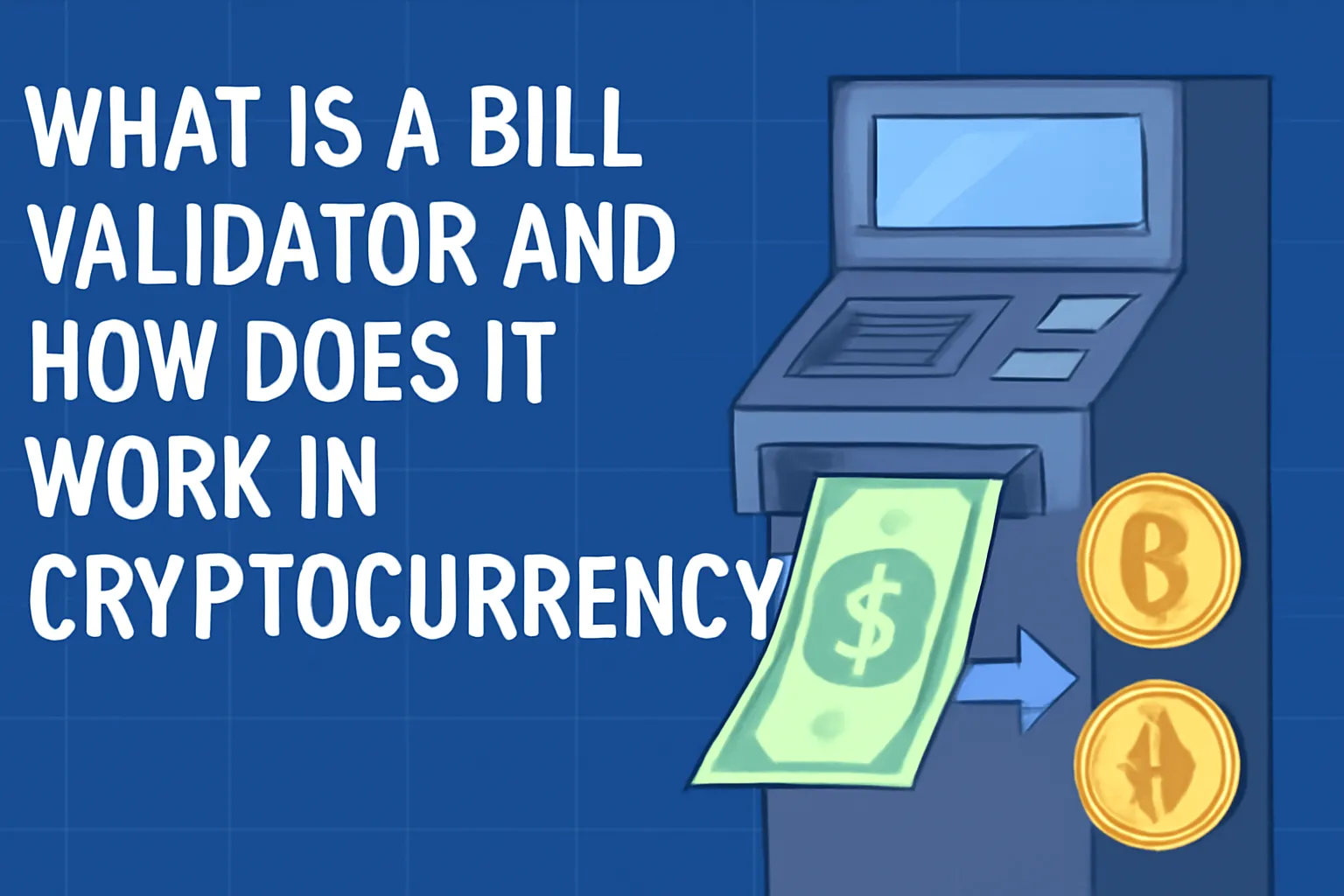What is a Bill Validator? Crypto ATMs & Blockchain Applications
What Is a Bill Validator and How Does It Work in Cryptocurrency?
A bill validator is a highly advanced machine that is capable of accepting, authenticating, and processing actual paper money. Used widely in vending machine companies, casinos, and even in cryptocurrency ATMs today, bill validators are now a major part of the digital currency infrastructure. With the rise of crypto payments and digital currencies like Bitcoin, Ethereum, and others, these machines now have a unique role to play in facilitating cash-to-crypto conversion. This article explains how bill validators function, how crucial they are in the realm of crypto, and why businesses that handle cryptocurrency payments employ them.
Table of Contents
- What is a Bill Validator?
- How Do Bill Validators Work?
- Types of Bill Validators Used in Crypto
- Applications of Bill Validators in Cryptocurrency
- Advantages of Using Bill Validators in Crypto ATMs
- Challenges and Security Concerns
- The Future of Bill Validators in the Crypto World
- Conclusion
1. What is a Bill Validator?
A Bill validator is machinery used to verify and process paper bills.
Its only function is to detect real money and correct denomination. Hitherto, these types of machines find themselves placed within vending machines, casinos, and automated tellers.
With blockchains developing alongside electronic money and electronic money gaining acceptance for everyday transactions, bill validators now find themselves placed in blockchain pay systems and cryptocurrency ATMs. In crypto transactions, they serve as a middleman by converting cash into digital currency like Bitcoin or Ethereum, leveraging cryptocurrency convenient for individuals new to digital currency information or without bank accounts.
2. How Do Bill Validators Work?
Bill validators employ advanced technologies in reading paper bills, including:
- Optical Sensors: Detect features like size, color, and security features on bills.
- Magnetic Sensors: Identify magnetic features incorporated into the bill for added security.
- Infrared Detection: Authenticate currency designs against genuine bills.
- Weight Sensors: Check the weight of the bill to meet standard currency weight.
When checked positively, the validator retains the bill securely and, for crypto transactions, initiates cash conversion into digital currency based on current market rates.
3. Types of Bill Validators Used in Crypto
Various types of bill validators used within crypto environments, specifically crypto ATMs:
- Stand-alone Validators: Stand-alone components usually used in crypto kiosks or ATMs, getting bills directly and converting them to cryptocurrency.
- Incorporated Validators: Built into traditional POS (Point of Sale) platforms meant to be used for accepting both cash as well as cryptocurrencies, connecting real-world bills to payment digital networks.
- Modular Validators: Modular units that are re-usable for various applications, like vending machines, gambling machines, or DeFi protocols.
4. Applications of Bill Validators in Cryptocurrency
Bill validators serve a range of purposes in the crypto space:
- Crypto ATMs: They enable customers to swap cash and receive cryptocurrencies like Bitcoin, Ethereum, or Litecoin. The validator verifies bills for authenticity prior to releasing digital currencies by the machine.
- POS Systems: POS terminals that have bill validators and are crypto-enabled allow companies to accept physical cash as payment for digital currency, especially in regions with weak banking infrastructures or large unbanked populations.
- Cash-to-Crypto Platforms: Bill validators are used by some platforms to credit cash directly to crypto accounts, bypassing conventional banking channels.
5. Advantages of Using Bill Validators in Crypto ATMs
There are several benefits of the use of bill validators:
- Greater Accessibility: They enable the conversion of cash to cryptocurrency, especially in rural areas where there are limited banking services.
- Greater Trust: Authenticity verification generates greater customer trust, which guarantees that the money is the users’ and authentic.
- Enhanced User Experience: Cash processing automation leads to faster, smoother transactions with less waiting time and fewer human touchpoints.
6. Challenges and Security Concerns
As helpful as bill validators prove to be, they have a few problems concerning the world of cryptocurrency:
- Counterfeit Detection: While sophisticated sensors assist in detection against counterfeit notes, counterfeiters never cease devising new tactics against it, and therefore continual updating and making changes must be carried out.
- Maintenance Cost: Installing and keeping these machines, especially in hostile environments like crypto ATMs, is costly.
- Security Risks: As with any hardware, bill validators can be hacked or tampered with, and this could result in counterfeit payments or theft.
7. The Future of Bill Validators in the Crypto World
As digital currencies gain popularity, the usage of bill validators will become more prevalent. Some of the futures could include:
- Blockchain Integration: Direct linking of validators to blockchain networks to streamline transaction processes and make them transparent.
- Mobile Payment Compatibility: Incorporation of bill validators into mobile crypto wallets to enable users to exchange cash to cryptocurrency using their mobile devices.
- Improved Security and User Interface: Future improvement will probably be in enhancing security features and designing interfaces easier to use, hence making cash-to-crypto conversions smoother and safer.
8. Conclusion
Bill validators are critical to fill the gap between cash and digital currency. By enabling the loading of cash in payment platforms and crypto ATMs, they are facilitating easier access to digital currency.
As the ecosystem of cryptocurrencies develops, ongoing development in technology, security, and user experience will be required in order to achieve mass adoption. Ongoing development in bill validators will assist in making cryptocurrency mainstream and accessible.
FAQs
What is the role of a bill validator in a crypto ATM?
It confirms physical bills inserted into the machine and permits cash to be exchanged for cryptocurrency, confirming the bills are legitimate before it completes the transaction.
Are bill validators secure?
Though they employ all types of security devices like optical scan, magnetic detection, and infrared inspection, they cannot be totally immune to counterfeiting. They always require constant upgradation and new technology in order to combat new threats.
What are the most serious issues with crypto bill validators?
Among the many challenges the currency faces include the fact that counterfeit bills are not stopped, maintenance is very costly, and standard security patches have to be installed to avoid tampering or hacking.
What awaits crypto bill validators?
The future is more engagement with blockchain networks and mobile payment applications, ensuring more secure and smooth cash-to-crypto transactions and more convenient for consumers.




